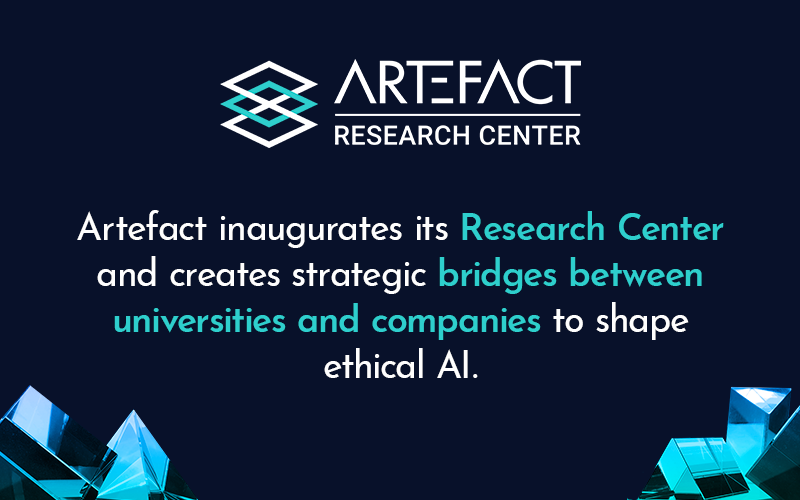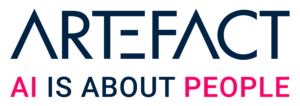Paris, 9 January, 2023
Artefact, a pioneer specializing in the deployment of artificial intelligence technologies and advanced data solutions, is taking a decisive step in its commitment to democratize AI by launching an unique structure in France. By 2025, this entity aims to bring together an ecosystem of 30 researchers from renowned academic institutions such as École Polytechnique, CentraleSupélec Paris-Saclay University, Sorbonne University, Paris 1 Panthéon-Sorbonne University, INSEAD, Toulouse III Paul Sabatier and ESCP Business School.
A unique, interdisciplinary approach to open and collaborative research
The mission of the Artefact Research Center is to establish an ecosystem centered around data, fostering collaboration between professors from leading universities and international corporate partners. Among the latter, Orange, Société Générale and Decathlon are already part of this initiative. These partnerships provide the Center’s researchers with access to anonymized corporate and industrial data, in strict compliance with regulatory guidelines. The results will be shared in the form of open source code packages and scientific publications.
In contrast to traditional research models, Artefact does not claim any intellectual property rights to the resulting output. This approach is designed to promote an open, collaborative ethic, free from the financial constraints of large corporations. The core of this strategy will be the study, exploration and development of solutions tailored to diverse professions, addressing the tangible challenges faced by businesses.The knowledge generated will be shared through scientific publications, international conferences, and open-source code.
Vincent Luciani, CEO and co-founder of Artefact, states:
“We are very proud to inaugurate this Research Center, which embodies our commitment to innovation and interdisciplinary collaboration. This represents an important step for Artefact that paves the way for a better adoption of AI by the organizations.”
Towards more manageable, transparent, and ethical AI
The research topics of the Center are based on the observation that despite technological advancements in AI, its widespread adoption by employees remains a challenge (see The State of AI in 2022). As a result, the gap is expected to widen between companies that have invested in the technology and those that have not. Faced with this challenge, the Research Center’s mission is to facilitate AI adoption by enhancing the understanding, robustness, fairness, and control of models. An example of a studied problem focuses on measuring and reducing statistical bias in computer vision models, particularly those related to faces, which are influenced by factors such as age, ethnicity, or gender. Another research topic focuses on improving the transparency and explainability of decision tree-based models with an emphasis on highly unbalanced datasets. Finally, a study on the factors influencing the adoption of AI in businesses, from an organizational perspective and in terms of user perception, is also underway.
Long-term collaboration with researchers from renowned academic institutions
The Artefact Research Center is already collaborating with researchers from leading academic institutions, including École Polytechnique, CNRS, CentraleSupélec Paris-Saclay University, Sorbonne University, Paris 1 Panthéon Sorbonne University, INSEAD, Toulouse III Paul Sabatier, and ESCP Business School. This collaboration extends across Management Science laboratories, such as Polytechnique’s CRG and ESCP Business School’s Sustainable Development Research Department, as well as at Applied Mathematics and Computer Science laboratories, including Institut Mathématiques de Toulouse, LPSM and SCAI at Sorbonne University, SAMM at Panthéon-Sorbonne University, and MICS, at CentraleSupélec Paris-Saclay University.
Erwan Scornet, Professor at the LPSM Department at Sorbonne University and an international expert in model explainability based on decision trees, shares his perspective:
“Collaborating with Artefact enhances the robustness and practicality of our work. Applying machine learning to these business cases introduces novel methodological challenges. Theoretical problem solving often leads to significant algorithmic advances. This approach allows students to combine hands-on experience with real-world data as well as a deeper understanding of the underlying concepts. The scientific findings are presented in research articles based on real-world applications, underscoring the benefits of collaboration between academia and industry.”
“We have reached a turning point in AI research, where the focus has shifted from enhancing models’ accuracy to improving their control, transparency, and reducing the risk of bias. These challenges include both technical and statistical aspects as well as societal and user experience considerations. Artefact offers an optimal environment for addressing these issues by combining an industry-informed perspective with the scientific excellence of academic research.”Emmanuel Malherbe, machine learning researcher and director of the Research Center.
One of the functions of the research center is to host doctoral theses, with ten Ph.D. projects launched in 2023. In addition, many of Artefact’s consultants, working from offices in the UK and Germany, actively contribute by publishing articles on online scientific archives alongside their client projects. These research endeavors are consistently influenced by and tested against challenges observed in the organizations. For the corporate partners, the Research Center serves as an unique and cross-disciplinary access to these professors, who belong to different laboratories and are recognized for their expertise in their fields.
An inaugural evening will be held on January 18th, 2024, bringing together political figures such as Paul Midy, Member of Parliament for Essonne and leading members of the research community, including Elisabeth Angel-Perez, Vice President of Sorbonne University, Paul Henry Cournède, Director of Research at CentraleSupélec, Gérard Biau, Director of Sorbonne Center for AI, and Céline Hudelot, Director of the MICS laboratory at CentraleSupélec Paris-Saclay University.
For more information about the Artefact Research Center, please visit our website. Details about the inauguration evening can be found in the program section.
ABOUT ARTEFACT:
Artefact is a leading global consulting company dedicated to accelerating the adoption of data and AI to positively impact people and organizations. We specialize in data transformation and data marketing to drive tangible business results across the entire enterprise value chain.
Artefact offers the most comprehensive set of data-driven solutions per industry, built on deep data science and cutting-edge AI technologies, delivering AI projects at scale in all industry sectors.
Artefact helps clients put consumers at the heart of their strategy through a comprehensive range of data-driven solutions. Designed to meet today’s clients’ specific needs, our services are delivered via a business-centric approach that is built upon deep AI expertise.
Our 1500 employees, present in 20 countries (Europe, Americas, Asia, Middle East, Africa) are focused on accelerating data & digital transformation.
More information on www.artefact.com.
CORPORATE COMMUNICATIONS
sophie.huss@artefact.com
PRESS CONTACT – TADDEO
maud.ollieric@taddeo.fr / 06 23 38 90 09

 NEWS
NEWS



